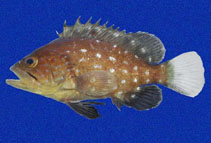| Family: |
Epinephelidae (Groupers) |
| Max. size: |
125 cm TL (male/unsexed) |
| Environment: |
demersal; marine; depth range - 55 m |
| Distribution: |
Eastern Central Pacific: Gulf of California to Panama. |
| Diagnosis: |
Dorsal spines (total): 10-10; Dorsal soft rays (total): 13-14; Anal spines: 3-3; Anal soft rays: 8-8. Distinguished by the following characteristics: adults dark brown without distinct markings; juveniles dark brown with several white spots and occasionally paler caudal fin; depth of body contained 2.3 times in SL; head length 2.2-2.3 times in SL; convex interorbital area; angular preopercle, enlarged serrae at angle and with or without few small serrae on lower edge; smooth interopercle and subopercle; posterior nostrils larger than anterior nostrils and shaped like an inverted tear drop; maxilla reaches vertical at rear edge of eye (Ref. 89707). |
| Biology: |
One juvenile examined came from a depth of 55 m. Reef-associated inhabiting depths of at least 55 m (Ref. 89707). Apparently too rare to be of commercial interest. |
| IUCN Red List Status: |
Least Concern (LC); Date assessed: 01 February 2018 Ref. (130435)
|
| Threat to humans: |
harmless |
Source and more info: www.fishbase.org. For personal, classroom, and other internal use only. Not for publication.
